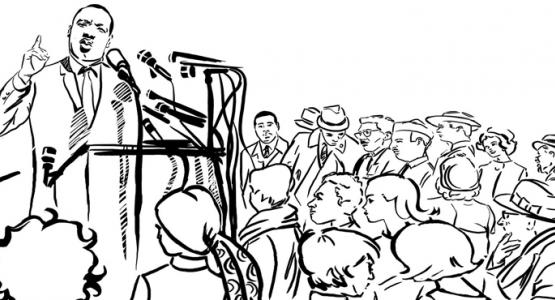
Remembering Dr. Martin Luther King, Jr. on the 50th Anniversary of His Death
Editorial by Terry Forde, CEO and president of Adventist HealthCare
April 4 was the 50th anniversary of the assassination of Dr. Martin Luther King, Jr., the American civil rights leader, pastor, and visionary who was fatally shot while standing on the second floor balcony outside his room at the Lorraine Motel in Memphis, Tennessee.
A Nobel Peace Prize laureate, Dr. King was one of the most visible leaders of the movement for civil rights in the United State. He was committed to the use of nonviolence in the marches and demonstrations that he was associated with.
Because of his role in the civil rights struggle, Dr. King was often the target of death threats, but he taught that murder would not stop the struggle for equal rights. On April 3, 1968, Dr. King spoke words that seemed to acknowledge this in the most personal way: “Well, I don't know what will happen now. We've got some difficult days ahead. But it doesn't matter with me now. Because I've been to the mountaintop. And I don't mind. Like anybody, I would like to live a long life. Longevity has its place. But I'm not concerned about that now. I just want to do God's will. And He's allowed me to go up to the mountain. And I've looked over. And I've seen the promised land. I may not get there with you. But I want you to know tonight, that we, as a people, will get to the promised land! And so I'm happy, tonight. I'm not worried about anything. I'm not fearing any man. My eyes have seen the glory of the coming of the Lord!”
The assassination of Dr. Martin Luther King, Jr. at age 39 dealt a severe blow to the Civil Rights Movement, but it also helped galvanize the resolve among Americans to acknowledge the rights of all people and to embrace the ideals that Dr. King stood for. In 1983, President Reagan signed a bill establishing the 3rd Monday of every January as Martin Luther King, Jr. Day (observance began in 1986). Dr. King is one of only three people who have a US national holiday observed in their honor (the other two are Christopher Columbus and George Washington).
Dr. King’s “I Have a Dream” speech has become so familiar to us now, especially his assertion that “I have a dream that my four little children will one day live in a nation where they will not be judged by the color of their skin but by the content of their character.”
On this landmark anniversary of the death of Dr. Martin Luther King, Jr., words from the speech he delivered when accepting the Nobel Peace Prize in 1964 continue to call us to live in ways that are just and right: “I refuse to accept despair as the final response to the ambiguities of history.... I refuse to accept the view that mankind is so tragically bound to the starless midnight of racism and war that the bright daybreak of peace and brotherhood can never become a reality.... I believe that unarmed truth and unconditional love will have the final word in reality. This is why right temporarily defeated is stronger than evil triumphant.”
Dr. Martin Luther King, Jr., January 15, 1929 - April 4, 1968. An American icon for justice and the rights of each of us.

Add new comment